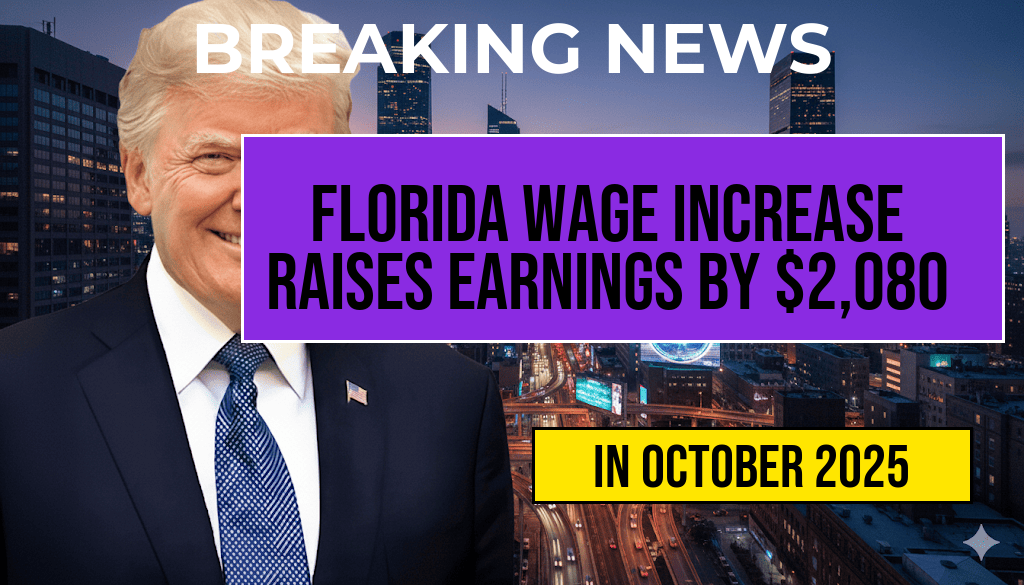Florida’s Minimum Wage Hikes to $14 Hour Could Significantly Increase Full-Time Workers’ Annual Earnings
Florida’s recent decision to elevate its minimum wage to $14 per hour represents a notable shift in the state’s labor landscape. Scheduled to take effect in September 2024, this increase from the current $11.25 marks a substantial boost for low-wage workers. For full-time employees working 40 hours a week, this change could translate into an additional $2,080 annually in earnings, providing economic relief for many struggling to make ends meet. The move aligns with broader trends among states aiming to address income disparities and improve living standards. As the Sunshine State prepares for this change, stakeholders—including workers, businesses, and policymakers—are closely examining the potential impacts on employment, consumer spending, and overall economic growth.
Details of the Wage Increase and Implementation Timeline
Florida’s minimum wage has steadily increased over recent years, with the new $14 rate scheduled to begin on September 1, 2024. This figure surpasses the federal minimum wage of $7.25, which remains unchanged since 2009, reflecting a state-level push for a higher standard of living. The planned increase is part of an initiative approved by voters in 2020, which mandates annual adjustments tied to inflation, ensuring wages keep pace with rising living costs.
The state’s Department of Economic Opportunity has outlined the phased approach, with subsequent increases projected for 2025 and beyond, potentially reaching $15 per hour by 2026. This gradual adjustment aims to mitigate economic disruptions for businesses while providing consistent income growth for workers.
Economic Impact on Full-Time Workers
| Hourly Wage | Weekly Earnings (40 hours) | Annual Earnings (52 weeks) | Difference from Previous Wage ($11.25) |
|---|---|---|---|
| $14.00 | $560 | $29,120 | +$2,080 |
| $11.25 | $450 | $23,400 | — |
For a typical full-time worker clocking 40 hours weekly, the wage increase from $11.25 to $14 results in a yearly pay boost of approximately $2,080. This additional income can help cover essential expenses such as housing, transportation, and healthcare, which have also seen rising costs.
Broader Economic and Social Considerations
Advocates argue that raising the minimum wage can reduce poverty levels, improve worker productivity, and stimulate local economies through increased consumer spending. According to economic studies, higher wages often lead to increased demand for goods and services, which can benefit small and large businesses alike.
However, some critics warn that significant wage hikes could pressure small businesses, potentially leading to layoffs or reduced hiring. A report by the Federal Reserve highlights the complex balance between wage increases and employment levels, emphasizing that impacts vary based on industry and regional economic conditions.
Stakeholder Perspectives
- Workers: Many low-income earners in Florida welcome the increase, viewing it as a step toward economic security and recognition of their contributions.
- Employers: Small business owners express concern about potential cost increases, especially in sectors heavily reliant on minimum-wage labor such as hospitality and retail.
- Policy Makers: Supporters see the wage hike as aligning with Florida’s economic growth goals, emphasizing its role in reducing income inequality and fostering a more equitable economy.
Looking Ahead
As Florida moves forward with its scheduled wage adjustments, ongoing monitoring will be crucial to assess actual impacts on employment, business viability, and worker well-being. State officials have indicated that they will review economic data annually to refine policies as needed, ensuring that wage increases support both workers and economic stability.
For more on minimum wage policies and economic trends, resources like Wikipedia’s minimum wage overview and reports from Forbes provide comprehensive background and analysis.
Frequently Asked Questions
What is the new minimum wage in Florida?
The minimum wage in Florida will increase to $14 per hour, marking a significant boost for workers across the state.
How will the wage increase impact annual earnings for full-time workers?
For full-time workers, the wage increase could result in an additional $2,080 in annual earnings.
When does the minimum wage increase take effect?
The wage increase is scheduled to take effect on [Insert Effective Date], providing immediate benefits for eligible workers.
Who will benefit most from the wage increase?
Full-time employees earning close to the minimum wage will benefit the most, as their hourly pay and annual earnings will see a notable rise.
Are there any future plans for minimum wage adjustments in Florida?
Yes, Florida plans to regularly review and adjust the minimum wage to keep pace with cost of living and economic changes, ensuring fair compensation for workers.

Leave a Reply